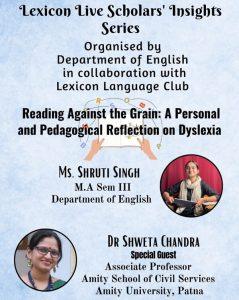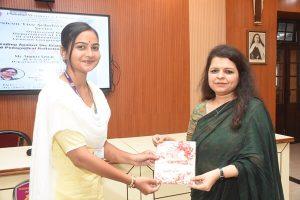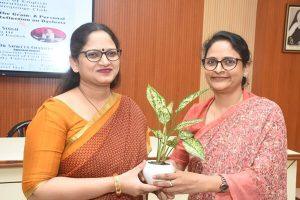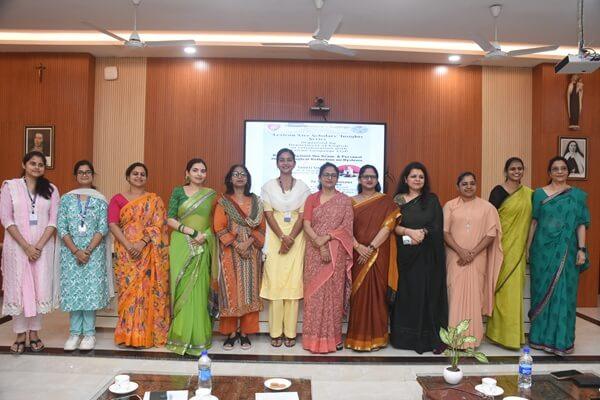Patna, July 31, 2025 — A session of Lexicon Live Scholars’ Insights Series was conducted today in Carmel Hall at Patna Women’s College, organized by Lexicon – the Language Club, in collaboration with the Department of English. The session, part of the college’s ongoing initiative to foster academic dialogue and linguistic awareness, focused on the topic “Reading Against the Grain: A Personal and Pedagogical Reflection on Dyslexia”.
The presentation was made by Ms. Shruti Singh, a postgraduate student of M.A. Semester III, Department of English, who explored dyslexia not only from an academic viewpoint but also from a deeply personal and pedagogical lens. Her insightful discussion emphasized the linguistic and cognitive dimensions of dyslexia, helping the audience understand the complexity of this specific learning disorder.
The session was attended by Dr. Shweta Chandra, Associate Professor, Amity School of Civil Services, Amity University, Patna, as the Guest of Honour. Dr Sahar Rahman, Head, Department of English felicitated the guest. The lecture was conducted under the academic guidance of Dr. Devina Krishna, Assistant Professor, Department of English, Patna Women’s College.
Ms. Singh’s presentation took a deep dive into the nuances of dyslexia — a difficulty in learning to decode and spell — through various linguistic components such as phonology, grammar, pragmatics, and semantics. She also discussed the cognitive mode of reading, including the two-route model, where Route A represents the direct path to word recognition, and Route B involves phonological mediation.
The audience gained valuable insights into the relationship between dyslexia and memory, such as working memory difficulties, phonological deficits, retrieval challenges, and how long-term memory, though less affected, remains fragile. A comparative reflection between childhood and adulthood dyslexia was also shared, highlighting how compensatory strategies differ across age groups.
Ms. Singh sensitively addressed the emotional experiences of dyslexic learners, pointing out how unsupportive environments can hinder their development, while also emphasizing the hidden strengths of the dyslexic brain. The session concluded with an overview of related learning disorders — dysgraphia and dyscalculia — and the importance of early intervention, its timing, targets, and effective approaches.
The session ended on a heartfelt note with the Vote of Thanks delivered by Soumya Vartika, Joint Secretary of the Student Council and a student of B.A. English, who acknowledged the speakers and organizers for their meaningful contributions.
The event left the audience enriched with a deeper understanding of dyslexia from both linguistic and cognitive perspectives and reaffirmed the college’s commitment to inclusive education and academic excellence.




